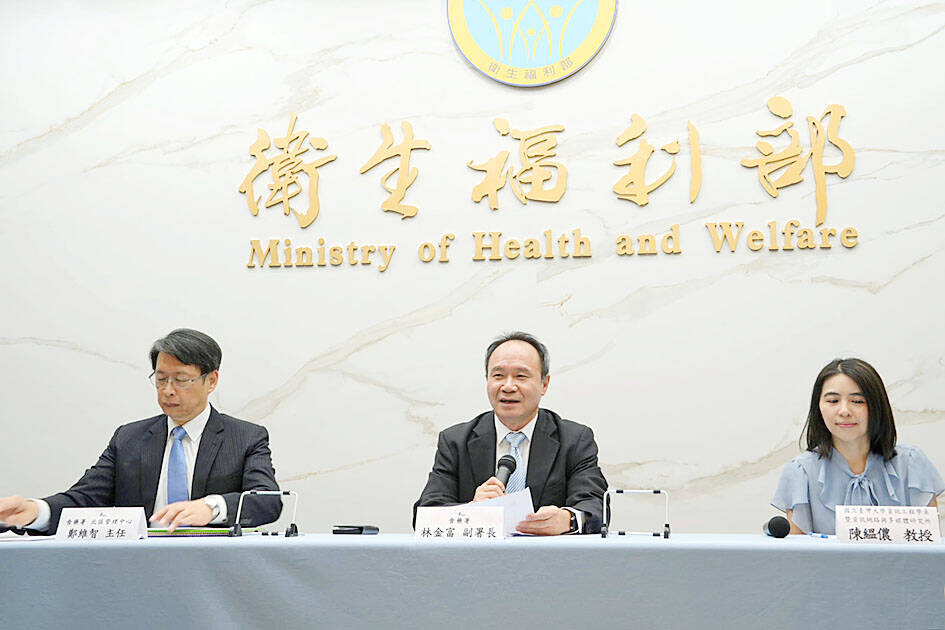The Food and Drug Administration (FDA) yesterday said it has been using an intelligent border prediction (IBP) system using artificial intelligence (AI) to select products for customs inspection since 2020.
The FDA said that the amount of imported food products has increased through years — from more than 400,000 batches imported in 2011 to more than 760,000 last year — but its workforce, budget and time for customs clearance are limited, so it introduced the IBP system in 2020.
Before the IBP system was introduced, inspectors would randomly select samples, FDA Deputy Director-General Lin Chin-fu (林金富) said, adding that with AI assistance, the system can more accurately select samples for inspection.

Photo: Chiu Chih-rou, Taipei Times
Imported food products that have been reported for inspection would first go through the automated import food inspection system to determine if they are subject to batch-by-batch inspection, regular randomly selected batch inspection, or reinforced randomly selected batch inspection, FDA Northern Center inspector Ho Chia-hua (何佳樺) said.
The IBP system analyzes risk levels based on several factors, such as noncompliance records, the country of origin and international food safety alerts, and decide which batches should be inspected, Ho said.
Before the IBP system was introduced, the inspection rate of fresh fruit was about 6.7 percent, and the inspection failure rate was about 3 percent, she said, adding that after the system was introduced, the inspection rate could be reduced to 4.3 percent, with an increased failure rate of about 3.8 percent.
The use of AI enables more accurate prediction of noncompliant products and their interception at customs, she said.
The IBP system has not only improved inspection efficiency, but has also helped the agency save about NT$4 million (US$133,690) of its annual inspection budget, she added.
In addition to local data, the IBP system also integrates food safety data from 14 food safety systems of 13 countries, so it also takes into consideration real-time alerts and public data from other countries, Lin said.
The agency has three methods to block further noncompliant products, FDA Northern Center Director Cheng Wei-chih (鄭維智) said, citing last year’s incident of chili pepper powder products with Sudan dyes as an example.
The importers were required to provide test reports proving no Sudan dyes were used, and AI was used to assist in selecting batches for inspection, while importers whose products had failed inspection were added to a list of enhanced monitoring, he said.
There are only 71 FDA inspectors conducting border inspections nationwide, but the Cabinet has announced it would allow the agency to recruit more people, and as a result 33 new inspectors would join the agency in September, Lin said.

The manufacture of the remaining 28 M1A2T Abrams tanks Taiwan purchased from the US has recently been completed, and they are expected to be delivered within the next one to two months, a source said yesterday. The Ministry of National Defense is arranging cargo ships to transport the tanks to Taiwan as soon as possible, said the source, who is familiar with the matter. The estimated arrival time ranges from late this month to early next month, the source said. The 28 Abrams tanks make up the third and final batch of a total of 108 tanks, valued at about NT$40.5 billion

Two Taiwanese prosecutors were questioned by Chinese security personnel at their hotel during a trip to China’s Henan Province this month, the Mainland Affairs Council (MAC) said yesterday. The officers had personal information on the prosecutors, including “when they were assigned to their posts, their work locations and job titles,” MAC Deputy Minister and spokesman Liang Wen-chieh (梁文傑) said. On top of asking about their agencies and positions, the officers also questioned the prosecutors about the Cross-Strait Joint Crime-Fighting and Judicial Mutual Assistance Agreement, a pact that serves as the framework for Taiwan-China cooperation on combating crime and providing judicial assistance, Liang

A group from the Taiwanese Designers in Australia association yesterday represented Taiwan at the Midsumma Pride March in Melbourne. The march, held in the St. Kilda suburb, is the city’s largest LGBTQIA+ parade and the flagship event of the annual Midsumma Festival. It attracted more than 45,000 spectators who supported the 400 groups and 10,000 marchers that participated this year, the association said. Taiwanese Designers said they organized a team to march for Taiwan this year, joining politicians, government agencies, professionals and community organizations in showing support for LGBTQIA+ people and diverse communities. As the first country in Asia to legalize same-sex

MOTIVES QUESTIONED The PLA considers Xi’s policies toward Taiwan to be driven by personal considerations rather than military assessment, the Epoch Times reports Chinese President Xi Jinping’s (習近平) latest purge of the Chinese People’s Liberation Army (PLA) leadership might have been prompted by the military’s opposition to plans of invading Taiwan, the Epoch Times said. The Chinese military opposes waging war against Taiwan by a large consensus, putting it at odds with Xi’s vision, the Falun Gong-affiliated daily said in a report on Thursday, citing anonymous sources with insight into the PLA’s inner workings. The opposition is not the opinion of a few generals, but a widely shared view among the PLA cadre, the Epoch Times cited them as saying. “Chinese forces know full well that